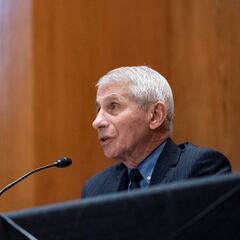What have Dr Fauci's emails revealed about the pandemic in the US?
A raft of newly-released emails from the start of the pandemic show how the Chief Medical Advisor grappled with issues like masks, the origin of covid-19 and his new-found celebrity.


Throughout the pandemic Dr Anthony Fauci, director of the National Institute of Allergy (NIA) and Infectious Diseases, has been a near constant presence, spearheading the government's response. President Joe Biden made him White House Chief Medical Advisor and he has played an even more central role under the new administration.
However a raft of more than 3,200 emails spanning January to June 2020 give new insight into Fauci’s initial thoughts as the pandemic took hold and how he corresponded with key figures to coordinate the US response. Here’s what we now know…
Fauci initially dismissed the ‘Wuhan lab leak’ theory
In the early months of the pandemic, former President Trump made vague accusations that the Chinese authorities were not being truthful in their account of the source of covid-19. A number of right-wing publications also forwarded the rumours that SARS-CoV-2 could have been manmade.
Emails from January 2020 show the director of the country's largest biomedical research facility suggesting to Fauci that the "unusual features" of covid-19 may suggest it had been “engineered.”
The 3,234 pages of Dr. Anthony Fauci's emails, released through a Freedom Of Information Act request, provide a rare inside look at our country's scientific enterprise and its intersection with the rest of our federal government | @meganranney, @CNNOpinion https://t.co/axictIOnjo
— CNN (@CNN) June 3, 2021
Fauci also received an email from Dr Francis Collins, director of the US National Institute of Health, in April which contained the subject line “conspiracy gains momentum” with an attached link to a Fox News report claiming that the allegation had merit. Fauci’s response is redacted, but this shows that he was aware of the theory more than a year before he eventually admitted that it had some merit.
Changing advice on mask-wearing
The medical advice has changed almost constantly throughout the past 15 months as experts scrambled to understand the new virus and its characteristics. In an email exchange from February 2020, Fauci tells former US health secretary Sylvia Burwell that store-bought masks are "not really effective in keeping out virus, which is small enough to pass through material".
He added: “Masks are really for infected people to prevent them from spreading infection to people who are not infected rather than protecting uninfected people from acquiring infection."
However Fauci would come on to become a key figure in encouraging Americans to ‘mask-up’, frequently drawing criticism from Republican lawmakers for saying they were essential.
#Fauci says masks aren’t needed unless you’re sick and notes the #SARS_CoV_2 is so small it passes easily between #mask fibers #Fauciemails pic.twitter.com/8mdPVPho2L
— Phil Holloway™ ⚖️✈️ 😁 (@PhilHollowayEsq) June 2, 2021
Fauci confides that he is exhausted as the pandemic takes hold
He had held his role as director of the NIA since 1984 but the extraordinary circumstances of the pandemic thrust him into the limelight in a way that he could never have anticipated. As early as 4 February, Fauci replied to a journalist saying: “I am really tired. Not much sleep these days.”
By 8 April he had received an email from George Gao, Chinese health official, who sympathised with Fauci’s “irrational” attacks in the media. Fauci replied: “Thank you for your kind note. All is well despite some crazy people in this world.”
Related stories
Fauci’s bemusement at his new-found celebrity continued as the pandemic wore on, expressing discomfort as T-shirts, socks, bobbleheads and doughnuts baring his image began to pop up around the country.
He did at least maintain a sense of humour in relation to his bizarre surge to prominence, reflecting on a Saturday Night Live (SNL) sketch that saw Brad Pitt impersonate him: “One reviewer of the SNL show said that Pitt looked ‘exactly like me.’ That statement made my year.”

